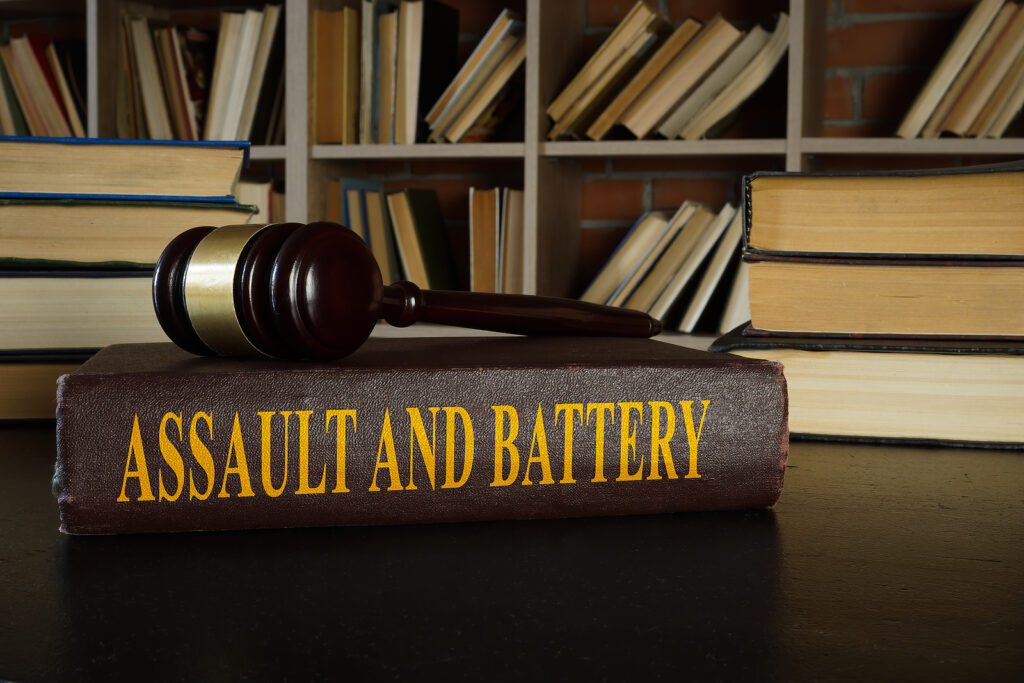Assault and Battery: Are They The Same? What to Know
If you were arrested and charged with assault or battery (or both) in Nevada, it is important to understand what the prosecution must prove to convict you. We often hear “assault and battery” used together, leaving one to wonder what the difference is between the two crimes. Are assault and battery the same under Nevada law?

What Constitutes an Assault Under Nevada Law?
Governed by NRS 200.471, assault is defined as “Unlawfully attempting to use physical force against another person” or “Intentionally placing another person in reasonable apprehension of immediate bodily harm.”
You are not required to touch the alleged victim for an assault to have occurred. For example, if you attempted to hit someone, but missed, that could be an assault. Likewise, threatening to hit someone or harm someone without actually doing so could qualify as an “assault” under Nevada law. Although words alone are not usually enough for an assault conviction, an outright verbal threat to harm someone could be construed as an assault if the target believed they were in “reasonable apprehension of immediate bodily harm.”
How Is Battery Defined Under Nevada Law?
The criminal offense of battery, governed by NRS 200.481, is defined as “any willful and unlawful use of force or violence upon the person of another.” Common examples of a battery include hitting, biting, pushing, or stabbing someone.
Note that if the alleged victim was someone with whom you have or had a domestic relationship, you could be charged with battery domestic violence under NRS 33.018.
Are Assault and Battery the Same Under Nevada Law?
No. Assault and battery are not the same crime under Nevada law. It is, however, common to be charged with both assault and battery if the conduct meets the requirements of battery under NRS 200.481 because an assault typically turns into a battery the moment you make physical contact with the alleged victim.
What Are the Potential Penalties for Assault in Nevada?
“Simple” assault, meaning there are no aggravating circumstances, is charged as a misdemeanor in Nevada. If convicted, you face up to six months in jail and/or a fine of up to $1,000.
Assault can also be charged as a gross misdemeanor if the alleged victim falls into a protected category, such as a police officer, school employee, healthcare worker, or sports official. If convicted of a gross misdemeanor, you can be sentenced to up to 364 days in jail and fined up to $2,000.
If the assault was made with the use of a deadly weapon or the present ability to use a deadly weapon, assault becomes a category B felony, punishable by a minimum of one year and a maximum of six years in prison and/or a fine of up to $5,000.
What Are the Potential Penalties for Battery in Nevada?
Like assault, “simple” battery is charged as a misdemeanor, punishable by up to six months in jail and/or a fine of up to $1,000.
Battery also becomes a gross misdemeanor when the alleged victim is a protected class member, subjecting you to a sentence of up to 364 days in jail and a fine of up to $2,000 if convicted.
Battery without a deadly weapon but that causes substantial bodily harm to the victim or that is committed by strangulation is a category C felony, punishable by a minimum of one year and a maximum of five years in prison and/or a fine of up to $10,000.
If the battery was committed with the use of a deadly weapon, battery can be charged as a category B felony. If no substantial bodily harm occurs, you can be sentenced to a minimum of two years and a maximum of 10 years for battery with a deadly weapon. If substantial bodily harm occurs or the battery was committed by strangulation, battery with a deadly weapon carries a minimum of two years and a maximum of 15 years in prison. You can also be fined up to $10,000 for battery with a deadly weapon.
What Should I Do If I Am Facing Assault or Battery Charges in Las Vegas?
If you have been charged with assault or battery in Las Vegas, consult with an experienced Las Vegas criminal defense lawyer at The Vegas Lawyers as soon as possible to discuss your next steps. Call us at 702-707-3000 or contact us online.

